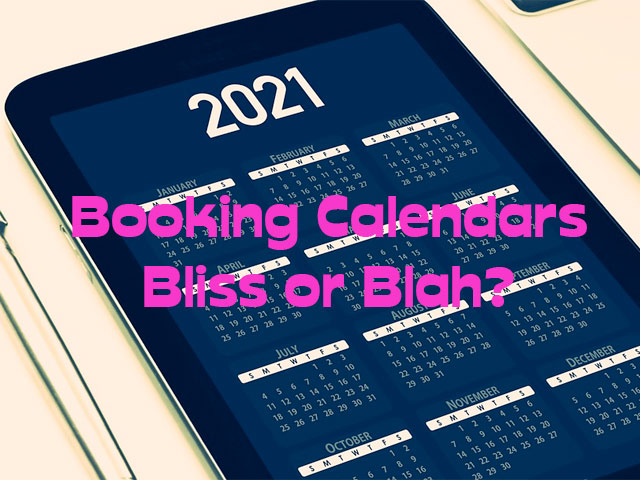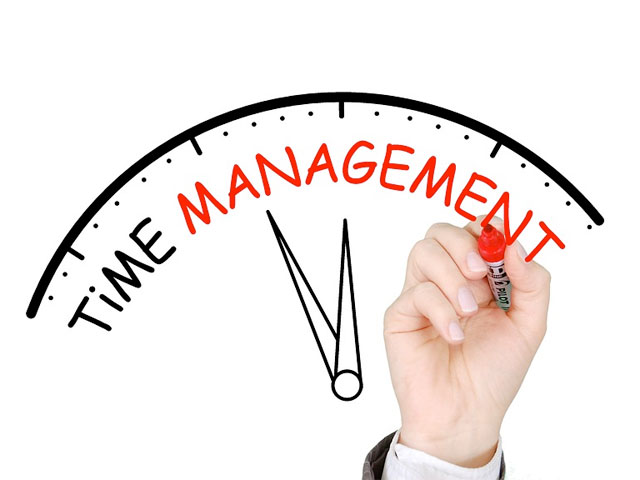I’ve noticed people often express strong feelings about the use of booking calendars. They either love them or hate them.
I get it. I have definite opinions about them, too.
The debate is a good one. Are booking calendars a useful tool, simplifying the painful email process of settling on a good day and time for meeting with prospects and clients? Do they show respect for both people by saving time?
Or are they too impersonal and lead salespeople and marketers to be lazy? After all, you can just send the link with an invitation to meet so you can peddle your products and services and just hope they will book. People like that don’t put in the effort to build a relationship first and I’d suspect their low booking rates reflect that.
I think the answer is both – booking calendars are just a tech tool like any other that can be used well or can be misused. I wanted to learn more about what people think of them so I ran a poll on LinkedIn to find out. (You can view the post here: https://bit.ly/SandeeSolvesLIBookCalPost) In this article, I discuss what I learned and confirmed.
Build Relationships First
If the first contact someone makes with me is to sell their services or products and they share their booking calendar link inviting me to a meeting, I’m not booking. If don’t know you, then I have no reason to get on a call with you.
It’s like being asked to marry someone I haven’t even met. It’s not going to happen.
Often I can tell by looking at YOUR profile on LinkedIn and elsewhere that I’m not even your ideal prospect. Do your homework first to learn about me. Then if there is a good possibility we could collaborate or do business together, introduce yourself like a human being, not a sales machine. Get to know me and you’ll have a much better chance of getting a meeting with me.
And don’t fake that you don’t have time. Don’t elevate your importance by making it hard for me to find a date on your calendar in the reasonably near future. Be open to meetings within a week or two or else don’t invite me to meet with you.
If you really are that overloaded, then you need MY services to get your time managed better by growing your team or clearing out clients you shouldn’t be serving. But that’s a story for another day. (SandeeSolves.com to the rescue!)
Look, it’s not that hard. Anything that you would do networking in person you should still do online. Would you walk into any event, hand someone your business card, and immediately ask them to place an order with you? Of course not! They’d look at you like you had two heads and then walk away.
First, you need to approach the person, introduce yourself, and ask them about themselves. Learn about them. This is discovery time. Qualify them, don’t sell them. And then give them something of value. Position yourself as a giver, not a taker. For example, offer to make an introduction to someone who could help them or share useful information with them that will help them with their business.
The same is true with your digital presence. Follow the same steps, but virtually. Get to know people and bring value to them. That will draw them to you so you don’t have to chase them.
When Technology Makes Sense
Once you have invested the time building good relationships, then booking calendars, used correctly, are a time-saving tool because they end the back and forth emails. Holistic coach Shamekah Shaw pointed out how they help to find a compatible time for clients. No more of this in your Inbox:
Me: Is Thursday good for you?
You: No, but Friday works for me.
Me: Oh, but I’m not in the office Friday. How about next Monday?
And on and on until we find the right day and then the time on that day. Ugh! So much time and energy wasted!
The RIGHT way to use a booking calendar link is AFTER we have established a relationship with the person and are discussing the fact that we’d like to meet. This is our opportunity, like author Orly Zeewy noted, to show our respect for the other person’s time. At that point, my next question is usually:
“Would you like me to send you a link to my calendar so you can choose the day and time that works best for you? Or do you have a link you’d like me to use?”
No one has ever said no because we’ve already connected in other ways first. Once a booking link has been sent, all one of us has to do is click it and settle immediately on a date and time that fits both of our schedules. Done and done!
By asking if they would prefer to send their own link, I’m further reducing the friction in doing business with me like Bill McClain, President/CEO/Founder of StratusDial & Networking Solutions, does with his clients. I don’t mind booking on someone else’s calendar if that makes things easier for them, even though I prefer to use my own. Allowing them to choose is one way I consider the interests of others ahead of my own. It’s part of how I serve well.
Time Management
Sometimes we entrepreneurs are busy, sometimes we are profitable, and sometimes we are both. The idea is to help eliminate the “busy” and keep our time focused on being profitable while serving our clients to the best of our abilities. That’s when our booking calendar becomes a time-management tool.
We all only get 24 hours in a day and if we work ourselves to death, the only we have to show at the end of the day is exhaustion, burn-out, and nothing left to give to family, friends, and causes we are passionate about serving. We can manage our time better and set boundaries by determining when we are available and how many meetings we want to take in a day on a booking calendar.
As someone who struggles with saying “no” to meeting at everyone else’s convenience, I find this particular aspect of my booking calendar to have really changed my life. I’m not overwhelming myself with meetings anymore. I’m happy to meet with people and it’s easier to say yes by determining ahead of time how many meetings I want to take each day and what kinds as well as time-blocking my day to leave room to execute other tasks related to my business.
Lots of Choices
There are many booking tools from which to choose. You’ve probably used someone’s Calendly, Acuity, or others to book appointments. I chose to use Book Like A Boss because it’s geared beautifully to booking not just appointments, but also services, packages, recurring subscriptions, and even products. It also syncs very well with my regular calendar, keeping me from scheduling two appointments at the same time. (If you know me well enough, you know I’m going to tell you that I’m an affiliate, so ask me why I love BLAB! Or just sign up here under my link: https://bit.ly/SandeeSolvesBookLikeaBoss)
Another way to leverage your links to your various bookings in a booking calendar is to ask questions. If you’re at all like me, you have met a lot of people in a lot of different places, and it can be easy to lose track of why we have meetings scheduled. By using the custom questions feature in Book Like a Boss, I have a point of reference to go back and see the answers to the questions prior to the meeting to refresh my memory about why we are meeting. This works for both paid and free appointments and is especially valuable for my paid advising sessions because I can walk into a meeting better prepared to serve my client.
Poll Results
Drumroll, please! Here are the poll results and some of the comments I received on the poll that I think you’ll find insightful. I had 168 voters – thank you!
72% of the voters in my poll said they love their booking calendars. That’s a solid majority. All of us agreed we never send the link on the first exchange. We get to know people first. I love what Cindy Skalicky, an expert speaker trainer for teams, said, “There must be mutual interest or at least a hint of it.” Most of us admit that the only way to keep up with everything is by putting all of it on a calendar with reminders. As Nancy Becher put it, “I couldn’t live without mine.”
12% of poll responders said they have never used a booking calendar. Lee Ann Peter of FIF Marketing said while she does not use a booking calendar, she thinks it’s a very smart timesaver for both parties. Katrina Shaw agreed, so we hopped on a Zoom call to talk about how using a booking calendar can help streamline her VA business. She immediately realized how it can help both her and her clients have a better experience when it comes to setting up meetings. She also chose Book Like a Boss and loved it for setting up her free inquiry calls and paid services.
9% of the voters thought booking calendars were not good. One commenter agreed that they get rid of back and forth emails and make it easier to book, but he still didn’t like it. He said it still felt too impersonal, that “it’s all on me” to figure it out, and there were no options to move things around on calendars to figure it out, so he’s not a fan. That’s a fair observation. His workaround is to provide a short list of days and times in an email and invite the other person to pick one of them. That’s definitely an option if you choose not to use a booking calendar.
7% of people voted for Other and added some thoughtful comments like these from Meredith Messenger from InsureGood. She agreed that using a calendar link provides a better experience for the person trying to meet with her, but that using the tool correctly was key. For example, if a meeting is rescheduled or there is another technical hiccup and the meeting isn’t held, it can be embarrassing. Also, the questions need to be strategic and not make a person feel like they have to be pre-qualified before they get to speak to you.
What Do You Think?
Where do you stand on the booking calendars debate? Are they bliss or blah? Tell me in the comments. Find me HERE on LinkedIn. Follow me so you get notified when I run another poll and you can vote in the next one!
Are you looking for a business advisor who can help you run your business better, smarter, faster, and more profitably?
Book a work session with me HERE and let’s work on YOUR business. I’d love to use my 30 years’ experience running multiple businesses to help you!





